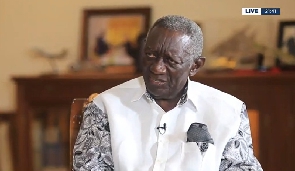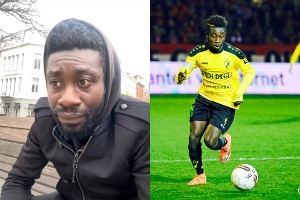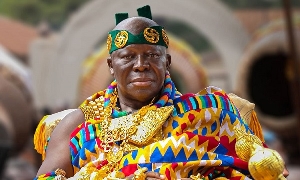Opinions of Wednesday, 13 November 2002
Columnist: Mahama, John
Religion - Opium Of The People?
Marx described religion as the opium of the people. In so doing Marx sought to indicate that religion was an opiate that deadened the senses of the people to the crass exploitation to which they were subjected by the ruling classes of society.
Marx had predicted that the expropriation of surplus value by the bourgeoisie as a result of their control of the means of production would lead to a sharpening of contradictions and thereby result in a revolution in which the working class will rise up against their rulers. This explosion will lead to the establishment of communist states all over the world in which the working classes will control their own destinies.
The philosophy of the principal religions, which believed that earthly life was transient and that the reward for a humble and pious existence would be received in a heaven beyond created a docile congregation that did not facilitate Marx’s idea of a simmering militant working class waiting to explode. This prompted the description by Marx, of religion as the opium of the people.
The two principal religions, Islam and Christianity entered the area that is modern day Ghana on the back of economic activity. Islam, which was the earlier to arrive, came into the Western Sudan through the Trans-Saharan trade. A southern extension of the Trans Saharan trade saw Hausa and Dyula traders bringing items like perfumes, ostrich feathers, fabrics and other oriental goods from the Western Sudanese metropoli in exchange for cola nuts, gold dust and other goods of the forest and Savannah. Many of these traders settled principally around Salaga in Northern Ghana. Along with this commercial activity came the tenets of the Islamic religion.
The principal instruments for the implantation of Islam as a religion in Northern Ghana came with the establishment of the Northern Kingdoms of Mamprusi, Gonja, Dagbon, Nannun and Wali. Islam came as a natural part of the political protocol of the courts of the kings of these great kingdoms. The patterns of Islamization can therefore be found mainly amongst the people of these kingdoms while the smaller autochthonous groups remained untouched. These groups were later Christianized mainly by Catholicism. This is why large swathes of the Upper East, the Dagares of the Upper West, and many minority groups in the Northern Region are Christian, mostly catholic.
Christianity is generally known to have entered the area of modern day Ghana from about the early 16th century. Christianity came into Ghana from a southerly direction. It came on the wings of the Trans-Atlantic trade. The early missionaries evangelized while simultaneously establishing schools from which they imparted a western education.
Before the advent of these two great religions, the inhabitants of present day Ghana were adherents of what is now generally referred to as African Traditional Religion. The adherents of this religion like the others believe in the existence of a supreme deity. They believed that the souls of all ancestors who died resided in a special place and could be invoked in an intercessory capacity in man’s relationship with the Supreme Being.
The constitution of Ghana declares that Ghana is a secular state. The freedom of religion is however guaranteed. It is very easy to observe that Ghana is quite a religious nation. In the past it was unimportant to know the religious denomination of one’s acquaintances. Today, the religion to which one belongs, is a commonly asked question. Especially so when one bears a name like John – Mahama. Are you Christian or Muslim? This is a question one encounters on virtually a daily basis.
With the advent of both Islam and Christianity into Ghana, the orthodox versions of the two religions found a way to peacefully co-exist both with themselves and the adherents of African traditional religion. Religious conflict was unknown.
From the decade of the 80s, the introduction of more fundamental brands of Christianity and Islam have resulted in some friction both within the main religions and between their adherents and those of other religions. These brands that preach a purer form of both religions have a lower degree of tolerance for persons who profess to faiths other than theirs. While Ghana has been spared the more extreme forms of religious intolerance as experienced in other countries, we cannot be too careful in implementing preventive measures to avoid any such occurrence.
Sporadic clashes between the Sunnis and the Tijaniyas is characteristic of such friction within the Islamic religion in Ghana. More recently a quarrel over a girl which resulted in clashes between members of the Zongo Community and residents of an Akyem town in the Eastern Region might have appeared quite benign, but had significant religious undertones. A clash between Muslim and Christian youth in Kumasi a few years ago following the condemnation of Islam by an itinerant Christian evangelist could have sparked a more serious conflagration if not maturely handled. Denominational disagreements leading to splintering of churches is quite common in the Christian domain. But perhaps more famous is the annual tension and occasional violence between the ‘charismatic’ churches and adherents of African Traditional Religion. This is particularly prominent in respect of the Ga Traditional Council’s annual ban on noise making.
One critical challenge that arises in the issue of religion as we practice it in Ghana, is how we can balance the salvation of our souls with the preservation of our cultural heritage. Most of our culture is inextricably linked with the rituals of African Traditional Religion. In advocating a strict abhorrence for any rituals associated with a religion other than theirs, the more fundamental breeds of the main religions discourage participation of their converts in traditional Ghanaian festivals.
The quarrel over the propriety of pouring libation is one such flash point. Some ‘charismatics’ feel quite strongly about it and are known to have walked away in protest from functions where libation has been poured.
The cultural erosion is also obvious in the Muslim domain. The abandonment of traditional northern Ghanaian names for Arabic names has led to an almost complete extinction of such names in Dagbon, Gonja, Mamprugu, Nannun and Wali. Names like Yussif, Mohammed, Hassan, Rashid are quite common. I have listened in admiration to the story of an unknown colleague who out of a patriotic sense of cultural preservation, jettisoned his given Arabic names and adopted an indigenous name which proves to be quite a mouthful but restores his sense of dignity and pride – Nbangba Suhuyini. ‘Nbangba’ means I now know them. ‘Suhuyini’ means unity or literally “one heart.”
In university a quite popular senior colleague to a lesser severity changed her name from Comfort Bukari to Akanbambiem Bukari. It appeared strange at the time and many colleagues found amusement trying their tongues out on the name. On hindsight, with that little action ‘Akanbi’ as we nicknamed her, restored part of the eroding cultural heritage of Northern Ghana.
It is important to note that while religion plays a role in cultural erosion, perhaps the most significant threat to cultural preservation is the effect of the pervasive import of mass western culture. We are bombarded through TV, Radio and indeed all means of communication by this culture. I am part of a generation affected by this. I did not know how to perform Gonja traditional dances until I became a Member of Parliament. Quick and careful observation and a little practice in the privacy of my room produced some steps akin to the graceful Gonja ‘damba’ dance. Even then, a few awkward steps during the Damba festival still spark quite some amusement from the watching crowd. This does not dampen my spirit and rather encourages me with a steely determination to throw in some waist gyrations for effect. If that is bad enough then the plight of our children is even worse. My sons have no clue what kind of musical harmony the famous ‘timpani’ and ‘mbontokurbi’ drums produce. I intend soon to exile them in Bole (my hometown) during the holidays much against their mother’s wish. Indeed I have no objection if they spend some time too in her hometown in the Brong Ahafo Region.
Another matter of significance in religion as it is practiced in Ghana, is the over-reliance on the power of prayer. There is the promotion of a certain perception that prayer alone can solve any problem one is confronted. This has engendered a certain attitude where a lot of Ghanaians expect a miracle in their lives. Unfortunately the era of receiving manna from heaven is effectively over. We can receive a miracle from our supplications to God only if we get off our butts and take action to solve the problems confronting us. God blessed man with a superior brain that distinguishes him from the rest of the animal species. He gave us that brain so we could use it to improve the quality of our lives. If we fail to utilize this great gift from God and just sit around hoping that he will constantly intervene to put things right in our lives, we would have lent credence to Marx’s conviction that religion is truly the opium of the people.













